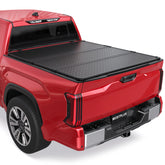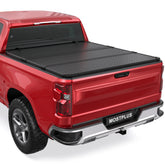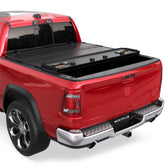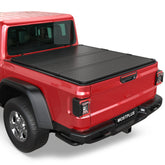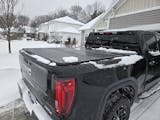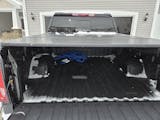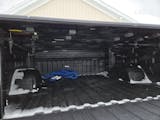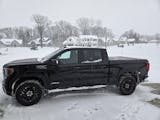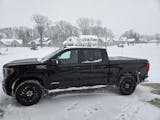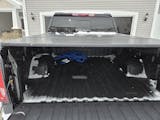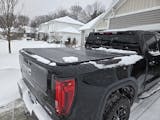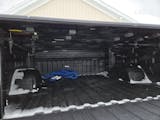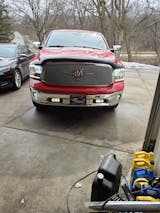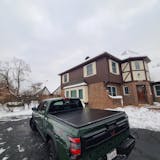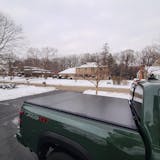How long do tonneau covers last?
Truck bed covers have long been very popular with truck owners. Whether you're hauling transportation, groceries, or sports equipment, a tonneau cover does a great job of protecting your truck. But for most owners, purchasing a tonneau cover is a sizeable investment. They often ask the question: how long will a tonneau cover last?
This question deserves serious consideration by all owners who are going to buy a tonneau cover; a long-lasting truck bed cover makes the owner's investment more worthwhile. In this article, our experts will give you an overview of the lifespan of different types of tonneau covers to help owners make a deal that is the best value for their money. Now let's get started.
Types of tonneau covers and their typical lifespan
The lifespan of a tonneau cover depends on the type of cover, the material used to manufacture it, how well it is maintained, and the environmental conditions it is subjected to. The average lifespan of a truck bed cover is about 3 to 10 years. The type varies in its durability. Soft roll-ups last roughly 3 to 5 years, hard covers usually last more than 5 years, and good quality ones can even last more than 10 years.
Before discussing the details of each type of tonneau cover, let's find out to see how long they last in general.
| Type | Average Lifespan |
| Soft Folding | 4 to 7 years |
| Soft Roll-up | 3 to 5 years |
| Hard Folding | 5 to 10 years |
| Retractable | 8 to 12 years |
| One-Piece | 15 to 20 years |
Now let's get into the details of each type of tonneau cover, and what features each type has that affect durability
How long do soft folding tonneau covers last?
Lifespan: A soft folding tonneau cover typically lasts 4 to 7 years. It has a life span between a soft roll up cover and a hard folding cover.
Structure & Materials: Soft folding tonneau covers consist of three or four collapsible panels, usually made of marine-grade vinyl or canvas material, and the panel frames are aluminum.

Advantages:
- Relatively inexpensive and cost-effective
- They are easier to fully install and remove than roll up covers
- Flexible in use as they can be partially or fully opened
- Provide basic cargo protection from weather and dust
Disadvantages:
- The material is softer, less anti-theft, easy to be cut or damaged
- Shorter lifespan than hard covers, they can wear out at the folds over time
- Not as weather-resistant as hard covers, prolonged exposure to sunlight may cause the vinyl to fade or crack
How to maintain:
- Clean surfaces regularly to avoid dust and debris buildup, using a mild detergent and a soft cloth, especially along creases.
- Use UV protectors to prevent deterioration and fading of the vinyl material.
- Check hinges and folding mechanisms and oil them regularly to maintain smooth operation.
- Avoid prolonged exposure to extreme weather conditions and park under cover if necessary
- If you remove it, it needs to be stored properly to prevent wrinkling.
How long do soft roll-up tonneau covers last?
Lifespan: The lifespan of a soft roll up cover is typically 3 to 5 years with proper care and maintenance.
Structure & Materials: Soft roll up tonneau covers are made of vinyl or canvas material and use a lightweight aluminum track system.

Advantages:
- Easy to use, the cover can be rolled up and secured to the front of the container for quick access to cargo.
- Relatively inexpensive and popular for those on a budget
- Lightweight, easy to handle, easy to roll up and open
- Provides basic protection from rain and dust
- Takes up little space when not in use and does not affect the capacity of the container
Disadvantages:
- Short service life, prone to wear and tear due to frequent use and adverse weather conditions.
- Long-term exposure to UV rays can cause the material to fade or crack due to UV rays or high temperatures.
- Requires regular adjustments to the track and tensioning system to maintain a good seal.
How to maintain:
- Clean the surface of the cover regularly with mild soap, water and a soft cloth, avoiding hard scratches.
- Apply a UV protectant every few months to prevent the material from fading and deteriorating.
- Regularly check and clean the rails to ensure they roll up smoothly and avoid jamming.
- Roll up and down gently to prevent tearing.
- Reduce exposure to sunlight or snowstorms.
- Avoid rolling up when wet or covered with snow.
How long do hard folding tonneau covers last?
Lifespan: Hard folding tonneau covers typically last 5 to 10 years and is one of the most popular choices on the market!
Structure & Materials: Hard folding tonneau covers consist of three or four rigid panels, usually made of aluminum, fiberglass or composite materials.

Advantages:
- High durability and long lifespan
- With strong anti-theft properties, the panels are strong and cannot be easily pried open.
- Good water and dust resistance to protect cargo from the weather.
- Provides a smooth, clean look that enhances the aesthetics of the vehicle
Disadvantages:
- Higher weight, more difficult to install and remove
- Typically more expensive than soft folding or roll-up covers
- Hinges and seals between panels are prone to wear and tear
How to maintain:
- Regularly clean and wax the panels to maintain a clean appearance.
- Regularly inspect hinges and locking mechanisms to ensure they are not damaged and are working properly.
- Protect metal parts from rust by using a rust inhibitor.
How long do retractable tonneau covers last?
Lifespan: Retractable tonneau covers are among the longest-lasting covers, with a life expectancy of 8 to 12 years.
Structure & Materials: Retractable tonneau covers are made of aluminum, polycarbonate or other durable materials and feature a roll-up mechanism. The cover is retracted on the box by a slide system, usually with motorized or manual controls.

Advantages:
- Highly flexible, can be fully or partially opened for easy access to goods
- Provide greater protection, often better water and theft resistance than soft covers
- Rugged construction and long service life, more durable than soft covers
- Contemporary design and high technology to enhance the appearance and functionality of the vehicle
Disadvantages:
- Higher price, usually more expensive than soft or hard covers
- Mechanical systems may require regular maintenance to maintain smooth operation
- Internal mechanisms may be affected in extreme weather conditions
How to maintain:
- Clean the cover and slide system regularly to avoid debris buildup.
- Regularly check and lubricate the slide and reel system to ensure smooth operation.
- Check and repair any damaged seals to prevent moisture from penetrating the container.
How long do one-piece tonneau covers last?
Lifespan: One-piece tonneau covers are the longest-lasting lids available, reaching 15 to 20 years!
Structure & Materials: One-piece covers are made of fiberglass, ABS plastic or aluminum. Designed as a single unit to cover the entire truck bed, they are hinged to the front of the truck compartment and are typically equipped with locking mechanisms and seals for added protection.

Advantages:
- Extremely high durability and long lifespan
- Excellent anti-theft properties, solid structure that is not easily pried open
- Good water and dust resistance
- Clean and smooth appearance, enhancing the overall aesthetics of the vehicle
Disadvantages:
- High weight, difficult to install and remove
- Fixed design restricts the flexible use of the truck bed and does not maximize the use of space in the lathe
- Typically more expensive than other types of tonneau covers
How to maintain:
- Clean the surface of the cover regularly and avoid scratching hard objects. If it is made of fiberglass, regularly use appropriate maintenance products to keep it shiny and protected.
- Regularly inspect and maintain seals to ensure no leaks
- Regularly check air pressure struts and replace them promptly
- Clean and lubricate the hinges every month
- Do not overload the cover when it is closed
Common tonneau cover brands and their lifespan
Now that you have an idea of the main five types of tonneau covers, let's take a look at how long common tonneau cover brands last.
|
Brand
|
Main types tonneau covers
|
Average lifespan
|
Price
|
|
Bak Industries
|
Hard folding, Retractable
|
10 to 15 years
|
$700 - $1,500
|
|
Extang
|
Soft folding, Soft roll-up
|
5 to 7 years
|
$200 - $500
|
|
Truxedo
|
Soft roll-up, Hard folding
|
5 to 10 years
|
$300 - $800
|
|
Roll-N-Lock
|
Retractable
|
5 to 10 years
|
$800 - $1,200
|
|
Access
|
Soft roll-up, Hard folding
|
5 to 7 years
|
$250 - $600
|
|
LEER
|
Hard folding, One-piece
|
15 to 20 years
|
$1,000 - $2,000
|
|
UnderCover
|
Hard folding, One-piece
|
15 to 20 years
|
$1,000 - $2,200
|
|
Gator
|
Soft folding, Hard folding
|
5 to 10 years
|
$250 - $700
|
|
Retrax
|
Retractable
|
5 to 10 years
|
$1,000 - $1,800
|
|
Rebel
|
Soft roll-up
|
3 to 7 years
|
$200 - $500
|
|
MOSTPLUS
|
Soft roll-up, Soft folding, Hard folding
|
3 to 10 years
|
$150 - $500
|
Factors affecting tonneau cover longevity
Regardless of the type of tonneau cover, several factors that can affect its longevity.
Material Quality
The quality of the materials used in the manufacture of tonneau covers plays a decisive role in their durability. Higher-quality vinyl, aluminum, fiberglass and ABS plastic covers tend to last longer than cheaper materials. For example, a premium soft vinyl cover with UV protection resists cracking and fading better than standard vinyl. Similarly, premium aluminum or fiberglass covers are less likely to be damaged by impact and harsh weather conditions. In short, high-quality materials can significantly extend the life of a compartment cover.
Weather
The environment in which your truck is located is one of the key factors affecting the longevity of your tonneau cover. Covers that are constantly exposed to heat, heavy rain, snow and UV rays are more likely to wear out. If you live in a harsh climate, such as Arizona, intense UV exposure can cause your soft cover to crack or fade more quickly. And moisture and snow can cause the frame of a soft or hard cover to rust and corrode.
Frequency Of Use
How often you use your truck bed cover will also affect its lifespan. If you roll, fold or close the cover frequently, it will wear out faster than if it is used less often.
Another point to keep in mind is that during use, hard covers may get scratches or dents from some heavy or sharp objects, and soft covers may get punctured or torn by sharp objects.
Maintenance
Proper maintenance will help extend the life of the tonneau cover. This includes cleaning, lubricating the hinges and locking mechanisms and checking for signs of wear or damage. If all of our owners have taken proper care of their tonneau covers, this will make them last longer than covers that are neglected.
How to extend the life of a tonneau cover?
Knowing the factors that affect the lifespan of a tonneau cover, our experts offer a few tips to extend its life.
Regular Cleaning: Clean your tonneau cover at least once a month to remove dirt, debris and contaminants that can cause damage over time. Use mild soap and water to clean the soft cover; do not use harsh cleaners. After cleaning, use a protective agent. For hard covers, clean the surface with a non-abrasive cleaner and water.
UV Protection: Applying UV protection to soft covers will prevent sun damage. Hard covers can be waxed to protect them from UV damage.
Inspect for Damage: Periodically inspect the tonneau cover for signs of wear and tear, such as cracks, tears, rust or loose fittings. Addressing these issues early can prevent further damage.
Avoid Overloading: Although the tonneau cover can support some weight, avoid placing heavy objects directly on the cover, which can cause it to dent or bend under excessive pressure.
Lubricating Moving Parts: For retractable lids, periodically lubricate the tracks and locking mechanisms to ensure smooth operation. This will prevent mechanical failure.
Store Properly: If you plan to remove your tonneau cover for an extended period, store it in a cool, dry place out of direct sunlight.
Avoid hauling with the cover open: When you are hauling tall objects, remove the cover completely and do not drive with the cover partially open.
Winter care: In climates with snow, remove snow from the cover promptly to prevent damage from excess weight and moisture.
Featured Products
- $479.99
$499.99- $479.99
- Unit price
- / per
- $549.99
$559.99- $549.99
- Unit price
- / per
- $489.99
- $489.99
- Unit price
- / per
- $469.99
$489.67- $469.99
- Unit price
- / per
